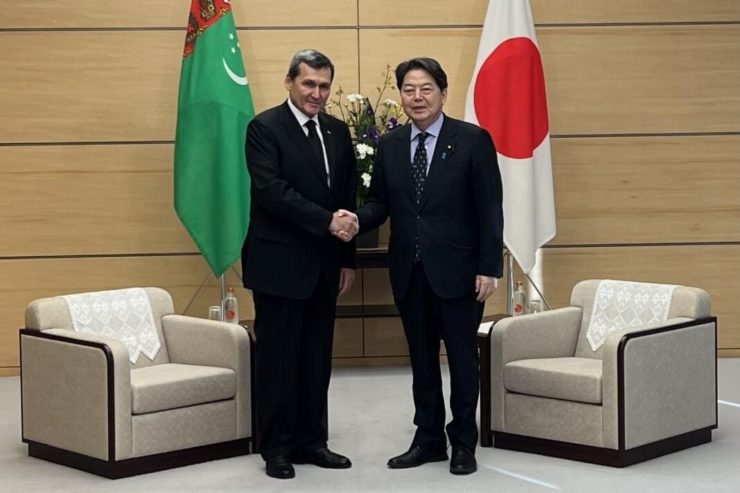
On 22-23 January 2024, Turkmen Foreign Minister R. Meredow visited Japan. During this trip, meetings were held with the Japanese Foreign Minister, the Ministers of Digital Transformation; Land, Infrastructure, Transport and Tourism; Economy, Trade and Industry; representatives of Japanese business, the Director of the Foreign Trade Organisation of Japan and the Head of the Export Credit Organisation of Japan.
The leitmotif of the talks was the cooperation between the two countries in the field of gas transmission and hydrogen production.
The first area is currently of strategic importance for Turkmenistan: apparently, the U.S. assistance in preventing methane leaks at gas pipelines in the country has proved insufficient – at the same time, these leaks are one of the main obstacles to the export of Turkmen gas to the European Union. Turkmenistan made a commitment at the Abu Dhabi Climate Change Conference (December 2023) to reduce methane emissions, dictated in part by the need to find new markets for its main export resource. It is likely that Japan can also help it to move in this direction. Turkmenistan also has other problems in the field of gas transportation, in particular, the lack of modern gas pipeline technologies.
At the same time, hydrogen production is a very promising industry for the republic. One of the technologies for environmentally friendly hydrogen production is steam conversion of methane and natural gas, both of which are available in Turkmenistan in more than sufficient quantities. Therefore, by developing hydrogen production, Turkmenistan can both diversify its very homogeneous exports and contribute to the fight against climate change. Japan can become a favourable partner for Turkmenistan in this matter – this country is one of the world leaders in the introduction of hydrogen in industry, energy and transport: its position in the field of hydrogen engines (both electrochemical converters and hydrogen internal combustion engines) for cars is particularly strong.
In turn, Japan is interested in providing projects to its large companies in foreign countries, as well as in optimising exports: in this respect, Turkmenistan, although a small state, may become a territory with a number of preferences for Japanese goods and firms in the domestic market due to the significant degree of centralisation of management of the national economy. Hypothetically, Japan, which is actively introducing hydrogen technologies in energy and transport, may be interested in its prospective imports from Turkmenistan: however, the logistical support of such supplies should be recognised as a very difficult task. Also, Japan is one of the largest importers of natural gas in the world, which may also be interested in Turkmenistan’s more traditional energy feedstock, but establishing supplies is difficult for the reasons already mentioned above. The parties probably see the solution to the logistical difficulties in the further development of continental highways in Central Asia – especially promising routes connecting the region to the Indian Ocean. The infrastructural interest of the Japanese in Turkmenistan is also proved by the visit of representatives of the Japan International Cooperation Agency (JICA) to the international sea port of Türkmenbaşy on 6 March 2024 “in order to get acquainted with the capabilities and services of the port”.
Following Meredow’s visit in January, a memorandum of cooperation between the two countries on cooperation in the field of decarbonisation was signed, reflecting the green agenda of the already discussed areas of cooperation.
Relations between Turkmenistan and Japan are generally rich in joint projects. For 15 years already, annual meetings of the Turkmen-Japanese Committee on Economic Cooperation have been held annually. An agreement with NEXI, a Japanese export credit agency, has been in place since 2015, under which the Japanese government has financed several projects in the republic. High-ranking representatives of Turkmenistan regularly visit Japan – for example, in 2021 the president of the republic visited Tokyo, and in 2022 the visit of the Minister of Foreign Affairs of Turkmenistan took place. Japan assisted Turkmenistan in the construction of a fertiliser plant, which was erected with the support of Japanese companies in 2014, as well as in the establishment of plastic products and packaging production in 2018.
A notable example of bilateral economic partnership is Japan’s participation in the construction of a facility in Turkmenistan to produce petrol from natural gas, which was put into operation a few years ago. By the way, following the results of the latest negotiations, the parties signed a memorandum on the creation of a second such complex.
Japan’s developing partnership with Turkmenistan organically fits into the general framework of the Central Asian vector of this country’s foreign policy. Thus, during the talks between the two countries, the fact of preparing the first-ever multilateral Central Asia-Japan summit to be held in 2024 was mentioned. In this regard, Japan’s choice of neutral Turkmenistan as a “guide” to active participation in the political and economic processes of Central Asia appears to be, among other things, an attempt to hide behind the neutral agenda of Japanese-Turkmen relations Tokyo’s long-term plans in the region aimed at rivalry with such countries as the Russian Federation and China. The motives for Japan’s prospective confrontation with the two continental powers in Central Asia can already be traced in the publications of major Japanese media. Japan had plans to expand its political and economic activities in the region as early as the 1990s: it is obvious that in the current realities of continental rivalry between Russia and China versus Japan and the United States, as well as the distinct “Americanophilia” of the country’s current political elite, these plans will have their place.
Boris KUSHKHOV, Department of Korea and Mongolia, Institute of Oriental Studies, Russian Academy of Sciences. Especially for online magazine “New Eastern Outlook”
